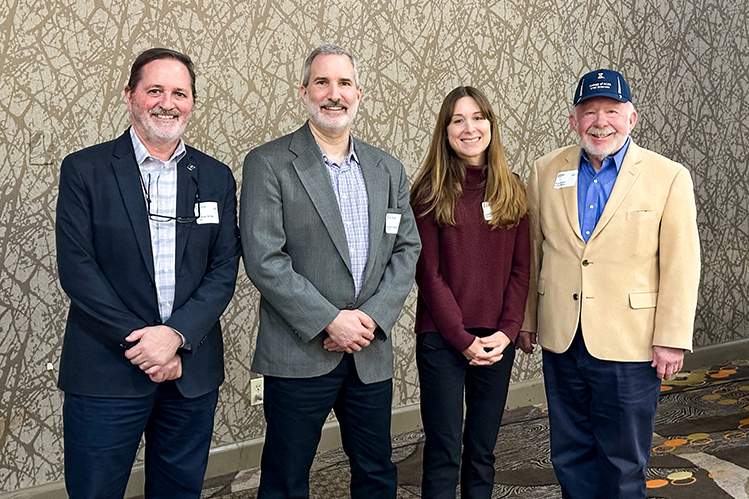Siemer Milling Company pledges $1 million gift to propel wheat research

During the 2024 Double Crop Farmers’ Forum on Monday, Siemer Milling Company announced a $1 million gift to launch the Siemer Milling Company Professorship and the Illinois Wheat Initiative within the College of Agricultural, Consumer and Environmental Sciences (ACES) at the University of Illinois Urbana-Champaign.
Founded in 1882, Siemer Milling Company is a family- and employee-owned business based in Teutopolis, Illinois, that specializes in crafting wheat flour, bran, and germ for grain-based foods. Their grain milling operations purchase 28 million bushels of locally-grown wheat and produce 840,000 tons of processed wheat products annually.
“We're delighted to be able to give back to the Illinois wheat growers who make our business possible,” said Richard Siemer, president of Siemer Milling Company. “Business has been good, and we look forward to partnering with the ACES wheat research team to make it even better for producers, processors, and consumers.”
College of ACES Dean and Robert A. Easter Chair Germán Bollero said Siemer Milling Company’s vision aligns with the college’s land-grant mission.
“Following three record-breaking years for Illinois wheat yields, this investment is critical to maintaining the industry’s momentum,” Bollero said. “This generous commitment will fuel our efforts to cultivate top-performing wheat varieties, optimize management practices, and unite academia, agriculturalists, and industry to safeguard access to a staple ingredient: wheat flour.”
Siemer Milling Company Professorship
The Siemer Milling Company Professorship will be held by a wheat breeder in the Department of Crop Sciences, providing a salary stipend and unrestricted support to advance research priorities.
Professor Jessica Rutkoski will be the first to hold the title. Her research applies quantitative genetics and statistics to make winter wheat more profitable and sustainable. Since joining the department in 2019, Rutkoski has re-invigorated the wheat breeding program by implementing new techniques that prioritize grower profitability using a ‘net merit’ selection index that weights individual traits according to their economic values.
“Jessica understands the economics of wheat — her ability to combine economics and breeding has blown us away,” Siemer said. “She's capable of both virtual and traditional breeding and doesn't mind getting her hands dirty. She is very astute and has been so impressive in her five years at Illinois. We wanted to encourage and promote her work. Jessica is making the industry better.”
Illinois Wheat Initiative
The Illinois Wheat Initiative will bring together faculty to collaborate on research related to wheat cultivation in Illinois. The hope is that other entities throughout the wheat value chain — including growers, millers, and food companies — will invest in the Illinois Wheat Initiative to advance the industry.
This initiative will help the Small Grains Improvement Lab (led by Rutkoski in the Department of Crop Sciences) secure technologies and staff to rapidly deliver superior soft red winter wheat varieties and information to farmers. It will also lay the foundation for proposals to secure large, multi-million-dollar research grants.
“As part of this initiative, we will employ novel breeding methods and tools to accelerate genetic improvement and ensure that growers can fully exploit the potential yield and quality of the wheat varieties that we are developing through innovative agronomic practices,” Rutkoski said, outlining four research priorities for Illinois Wheat Initiative funding:
- Expand current breeding efforts by deploying new research tools and methods, especially those that leverage low-cost genotyping and high-throughput phenotyping technologies.
- Create new varieties with greater economic value by integrating quality traits, such as percent grain protein and flour yield, into the selection process.
- Identify opportunities to maximize yield by investigating combinations of genetics and nutrient management techniques.
- Enhance the role of wheat in regional cropping systems through collaborations to optimize double and relay-cropping.
“Our research activities will culminate in new wheat varieties that enhance wheat profitability, information on how to optimize wheat management provided to growers, and the development of new collaborations and preliminary data that can be leveraged to compete for grant funding for future research,” Rutkoski said. “We are excited at the opportunity to have a palpable impact on wheat growers in our region and across the nation.”
To learn more about opportunities to support the Illinois Wheat Initiative, contact Director of Development Patrick Gavin at pjgavin@illinois.edu.